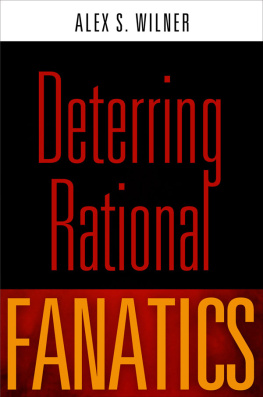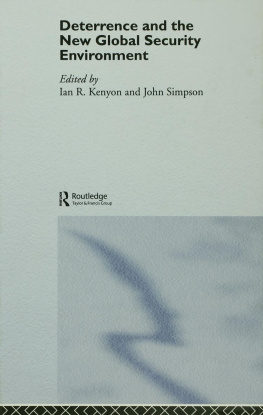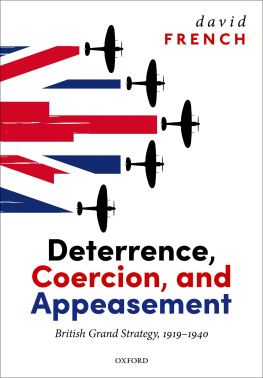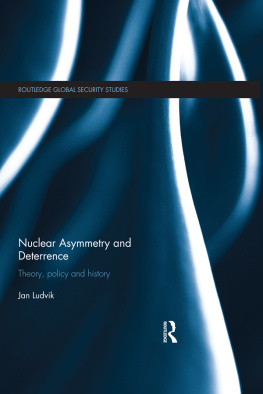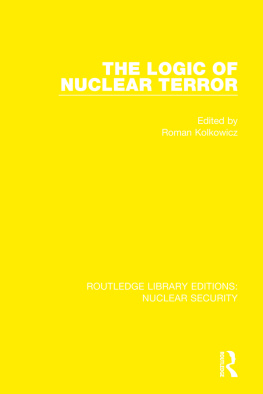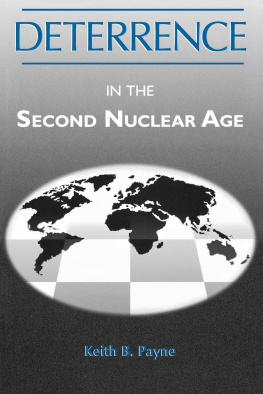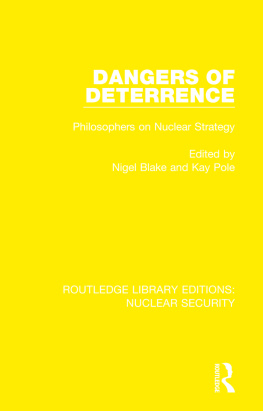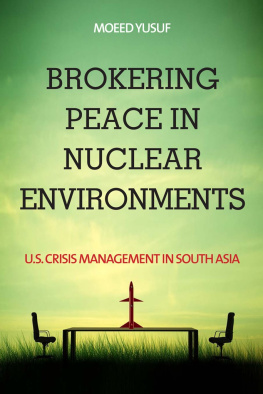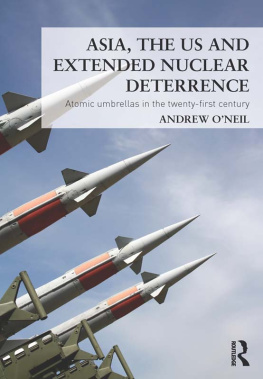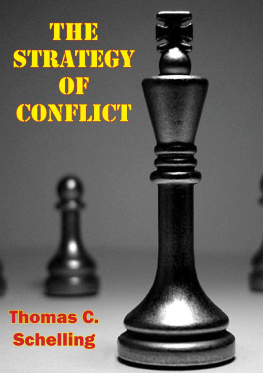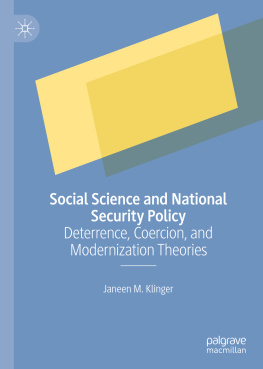Copyright 2015 University of Pennsylvania Press
All rights reserved. Except for brief quotations used for purposes of review or scholarly citation, none of this book may be reproduced in any form by any means without written permission from the publisher.
Published by
University of Pennsylvania Press
Philadelphia, Pennsylvania 19104-4112
Printed in the United States of America
on acid-free paper
1 3 5 7 9 10 8 6 4 2
Library of Congress Cataloging-in-Publication Data
Wilner, Alex S., 1979
Deterring rational fanatics / Alex S. Wilner. 1st ed.
p. cm.
Includes bibliographical references and index.
ISBN 978-0-8122-4668-1 (hardcover : alk. paper)
1. TerrorismPrevention. 2. Deterrence (Strategy)
I. Title.
HV6431.W56625 2015
363.325'17dc23
201402829
CHAPTER 1
Introduction
For decades, deterrence theory was the veritable bedrock on which American, British, Soviet, Chinese, Indian, and Israeli foreign and military policies were based. During much of the Cold War, these and other states tailored their relations and interactions with foes and friends alike on the basis of coercion, compellence, and deterrence. Classical deterrence theory is a product of that period: The development and proliferation of nuclear weapons in particular necessitated that wars between great powers be avoided or contained. Academics did their part by exploring the intricacies behind the logic and theory of deterrence and by outlining the promises and pitfalls of applying the theory to the practice of warfare. Few other theories of international relations have received such an extended period of attention and assessment.
With the collapse of the Soviet Union and its Communist bloc, however, deterrence theory was shunted off center stage. Major war between the great powers seemed exceptionally unlikely and rampant nuclear proliferation never occurred. Moreover, the conflicts that did emerge during the 1990s were often brushfire affairs or involved fighting within (rather than between) states, conflicts that deterrence theory was generally ill-prepared to properly address. Deterrence theory lost even more ground with the eventual refinement and ascension of competing doctrines, like counter-proliferation, preemption, and prevention, which offered states alternative ways to secure their national interests. But it was al Qaeda that sealed the theorys decline. Its 2001 terrorist attack on the United States seemed to defy the very premise on which deterrence theory was based. Terrorists were deemed irrational, stateless, and often fanatically (and religiously) dedicated to an immutable ideological cause. That al Qaeda had resurrected the kamikaze in its suicidal operatives The bottom line was that terrorists responded to force, not to the intricacies of coercion, and offensive and defensive counterterrorism trumped any and all talk of deterrence.
This book challenges the conventional wisdom. By expanding the scope of traditional deterrence theory and pairing it with a more nuanced understanding of contemporary terrorism, a variety of deterrents can be constructed and levied against terrorist organizations. When tailored appropriately, states can use the logic of deterrence to influence, coerce, and deter terrorist groups, delimiting the type and ferocity of the violence those groups are willing to use, and influencing their behavior more broadly. Deterrence theory is not a panacea for terrorism, but it can serve as a strategic guide for state responses. And although a healthy dose of skepticism may be prudent, relegating deterrence to the dustbin of strategic theory is both shortsighted and premature.
Deterrence Skepticism
In the years following 9/11, deterrence skepticism ran deep. Bushs arguments were echoed by an array of political and strategic commentators. At least part of this skepticism was a result of our collective reaction to 9/11. The tragedy was metquite justifiablywith an impulsive, an emotional, and even a reflexive response. Terrorism was not new, but the scale of the destruction visited on New York City and Washington, D.C.; the audacity of the attack itself (in which civilian airliners were used as guided missiles); the (supposed) religious justification underpinning the act; and the use of
Broadly speaking, deterrence skepticism incorporates five core arguments. First, the fundamentalist religiosity of al Qaeda and the religious motivation of many contemporary militants interrupts rational decision making, contradicting rational deterrence theory. This particular view resonates with academics, decision makers, and the general public. For the religious terrorist, American terrorism expert Bruce Hoffman explained, violence is first and foremost a sacramental act or divine duty executed in response to some theological demand or imperative. Terrorism thus assumes a transcendental dimension, and its perpetrators are consequently undeterred by political, moral, or practical constraints.
For illustration, consider the case of the Chechen suicide squad dispatched by the Special Purpose Islamic Regiment (SPIR) to Moscow, Russia, in 2002 on orders to attack the Dubrovka Theatre. Operatives clipped bomb-belts around their waists and wired the pillars, walls, and ceiling of the theater with explosives, underscoring that they were, as their spokesperson explained, more keen on dying than you [the hostages] are keen on living. In a tape delivered to the Moscow bureau of Al Jazeera, one of the nearly two dozen female terrorists involved in the attack added: It makes no difference for us where we will die. We have chosen to die here, in Moscow, and we will take the lives of hundreds of infidels with us. How can we possibly apply deterrence to that?
Second, skeptics assume that fanaticism creates diverging rational contextualizations, second realities, and deformed consciousnesses, which negate deterrence theory and practice in various ways. This, too, may impair deterrence. And, finally, religiously self-assured terrorists are prone to be highly motivated, decidedly risk-accepting, and innately resolute. Their threshold for pain and their willingness to accept extraordinary risks may be particularly high as a result. Some may believe they have nothing to lose. All of these arguments complicate the practice of deterrence in counterterrorism.
Third, some skeptics remark on the seemingly absurd objectives sought by some contemporary terrorist groups. As the adage goes: Modern terrorists dont want an invitation to sit at the table; they want to destroy the table and kill those already seated. American scholar Mark Juergensmeyer goes so far as to suggest that the new terrorism appears pointless since it does not lead directly to any strategic goal. It is the anti-order of the new world order of the twenty-first century. Less so today. Contemporary terrorism, deterrence skeptics maintain, is not only ruthless but also strategically rudderless. Everything and anything could and should be expected (hence, Rumsfelds proverbial unknown unknowns). This is problematic: Violence devoid of strategy is difficult if not impossible to deter.

